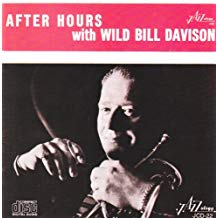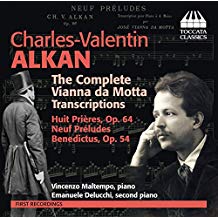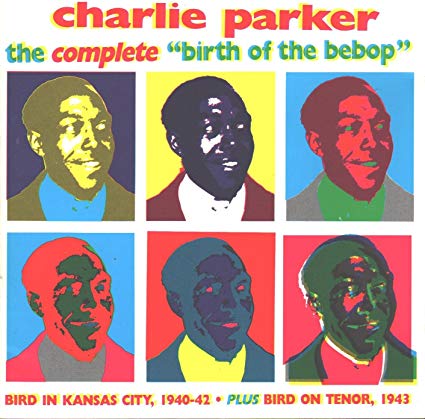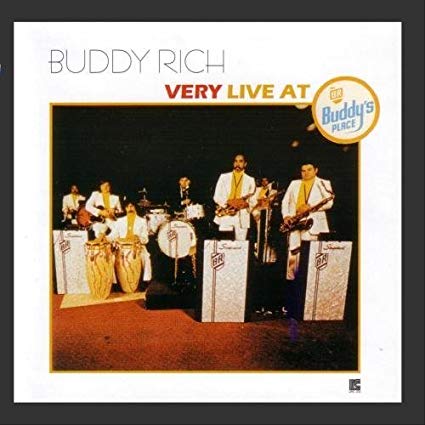-
Posts
13,205 -
Joined
-
Last visited
-
Donations
0.00 USD
Content Type
Profiles
Forums
Events
Blogs
Everything posted by Larry Kart
-

What Classical Music Are You Listening To?
Larry Kart replied to StarThrower's topic in Classical Discussion
-

What live music are you going to see tonight?
Larry Kart replied to mikeweil's topic in Live Shows & Festivals
Friday night at the Philadelphia Museum of Art caught the best jazz singer I've heard in some time, Washington, D.C.-based Christie Dashiell, daughter of a veteran bassist who heads a college jazz program in N. Carolina. Her trio is excellent. Her older brother on drums has some Vernell Fournier in him, I thought, and pianist Allyn Johnson is excellent. -
-
Donation sent.
-
If you don’t know this album already, you’re in for a treat. Wild Bill, Kenny Davern, pianist Charlie Queener and Geroge Wettling (no bassist) recorded in 1968 in a club in Columbus, Ohio. All in fine form, but Davison and Wettling are out of sight; it was Wettling's trio (and probably his final recording; he died in '68); Wild Bill sat in and recorded it all himself on his own tape machine — good sound too. .
-
https://www.youtube.com/watch?v=hLopWusx-ZU The above performances aren't the worst thing in the world, by any stretch, nor are they this, by any stretch:
-
Am about to leave town first thing tomorrow morning for almost a week, so no can do. But I can't imagine that examples of what I spoke of would be hard to find; rather, they were the norm. Typically, Rouse would play the head and then modestly decorate/modify the piece's given melodic/rhythmic/harmonic material (its skeleton, so to speak) until his solo had run its course. This approach was different from Rouse's approach (a good deal of the time) when he was away from Monk, and it was different as well from the approach of other soloists who played successfully with Monk -- e.g. Rollins, Lacy, Coltrane, Lucky Thompson, Milt Jackson, Thad Jones, Clark Terry, Ernie Henry, who am I forgetting? P.S. I'm a great admirer of Johnny Griffin but don't find his work with Monk to be that successful by and large. His sound and rhythmic approach were a good fit for Monk, but his more or less decorative hyper exuberance didn't really add anything essential to the mix IMO, though the results were ... well, good clean fun might be a way to put it. In any case, to play effectively with Monk, one needs to engage with his music on a structural level, not a decorative one.
-
Another thought about why Monk welcomed (or what you will) Rouse. In addition to taking up lots of solo space -- space that Monk himself typically was unable or unwilling to fill (indeed Monk seldom took lengthy solos ever) -- Rouse more or less played the skeleton of Monk's music back at him rather than presenting him with a reading of the material that might have been challenging by our lights but too divergent and/or independent and thus too challenging to the state where Monk was -- mentally and musically -- at that period in his life. Perhaps Monk needed support, and Rouse provided it.
-
The AFRS airchecks from Billy Berg's are beyond belief -- not only for Bird but also for Dizzy and Al Haig.
-
Pete Brown was said to have based his style on that of trumpeters.
-
As fate would have it, I ordered the above set after starting this thread and am enjoying it right now. Watkins is in fine form, Rouse, at least on the early tracks (from 1956), is not as warm and linear as he is on "Yeah!" (1960) -- his rather abrupt way of phrasing is quite distinctive at this point, it's kind of like he's running on tip-toe -- and he and Watkins blend handsomely on the varied, inventive charts. There's a certain delicacy to the group, akin to the sound of the contemporaneous Chico Hamilton Quintet. And the late Gildo Mahones contributes a number of sparkling solos. BTW Rouse's phrasing circa 1956 led me to wonder whether he ever played alto and, if so, dug Pete Brown.
-
Don't have Martin's review in front of me, but I think he detected/intuited the strung out aspects of EH and was put off by how seemingly overt they were. I'll look for Rusch's review; I'm familiar with him mostly as a producer.
-
Yup. While I admired and was friendly with Martin, as I once wrote, he could be quite the sober puritan. Tynan -- meh, or meh time three.
-
OK -- but just to be clear, I didn't mean that EH set out to dramatize his latter-day states of being, but that some listeners responded to his playing of that time in part as though aspects of his playing did dramatize/point to aspects of his states of being in a powerful, moving manner (not that this was all of EH, by a long shot, but it was IMO part of the package). After all, at that time, when so many notable players were affected by drug use, one couldn't help but be aware of that fact and be curious (if that's the right word) about the social/emotional/artistic realities of this. I rest my case:
-
To perhaps answer your question: Because Rouse was Rouse, and Griffin, Coltrane, and Rollins were Griffin, Coltrane, and Rollins. The latter two were not Monk's full time employees, for one, as Rouse was, and while Griffin was his FTE for a fair amount of time, JG clearly was irrepressible -- indeed his cadenza-like "I got it" solos with Monk are regarded by some as borderline outrageous/intrusive ego displays. Rouse may well have seen what I've described as "shadowing" Monk as part of the gig, but the results IMO are nowhere near as interesting as Rouse's work away from Monk -- before, during, and after.
-
But an in-tune Ernie Henry wouldn't have been Ernie Henry, nor IMO would an in-tune Jackie McLean (a less extreme case than EH) have been Jackie McLean. Further, in both of those cases, one notes certain vital aspects of their expressive packages (e.g. the way phrases are both attacked and "attacked") that are not wholly separate from their intonation habits (if you will). And what about Lee Konitz, especially in latter days? For me, that's a bit different, in that I don't find much in Lee's playing sharp that is part of his expressive package; it's just there, take it or leave it. But I think Lee has said that he needs to/wants to play a bit sharp for specific practical reasons -- though I don't recall what he said those reasons were. Perhaps to differentiate himself more strongly from the rest of the band than would be the case otherwise? BTW, I admit that even apart from intonation, EH is a special case -- the awkwardness and patent effort of his playing speaks to some of nothing but lack of competence, to others it's also a kind of moving dramatization of stress or even distress.
-
Thanks -- a natural evolution.
-
Impressive in that it's not easy to do but also, I would say, submissive, and/or suppressive of Rouse's own considerable virtues. Again, I can think of few Monk-Rouse recordings (though there are some, e.g. "Live at the It Club") ) where Rouse's contribution to the proceedings was much more than a matter of shadowing Monk's line and his comping. P.S. Also, though this runs counter to what seems to be the common view, I pretty much can't stand Frankie Dunlop, with all his cute coy "tinkle-bang" shadowing of Monk. At least Rouse is never cute or coy. I much prefer all the other all the drummers I can think who played with Monk -- off the top of my head, Max, Blakey, Klook, Philly Joe, Shadow Wilson, Ben Riley, Art Taylor. Who am I forgetting?
-
"I doubt that few other sax players could have meshed so perfectly with Monk." That's my complaint about Rouse with Monk, in effect -- the mesh was so perfect that Rouse was pretty much swallowed-up, made extraneous. He had more to say IMO when he was more in charge.
-
-
I'm one of those who has, with a few exceptions, never cared much for Rouse's work with Monk. To me, he seemed semi-trapped within Monk's pieces and by Monk's comping, more or less sounding out what was given. Aware of some Rouse in a non-Monk setting that was quite good -- e.g. his own c. 1960 album for Epic "Yeah" -- I was pleased to come across "Sphere on Tour" (Red) from 1985 and find that Rouse sounded quite relaxed and inventive. https://www.amazon.com/Sphere-Charlie-Rouse-Buster-Williams/dp/B002PORE9E/ref=sr_1_3?s=music&ie=UTF8&qid=1530750336&sr=1-3&keywords=sphere+on+tour From "Yeah":
-
And where and how did it proceed? I'm just curious.
-
I reviewed that Collins-Shepley album for DB back in the day, liked it, and still have my copy. Terrific tuba player there, Tony Price. Rest of the band, in addition to Collins, Shepley, Price, and Abene, is pretty impressive too -- Bernie Glow, tpt., Garnett Brown (amusingly mis-labeled "Garnett Grown"), trb., Paul Faulise, b. trb, Joe DeAngelis, Fr. Horn, Jerry Dodgion, reeds, Bob Cranshaw, Mickey Roker.
_forumlogo.png.a607ef20a6e0c299ab2aa6443aa1f32e.png)




